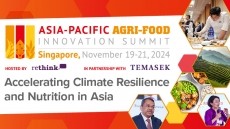FNA FOOD AND BEVERAGE TRAILBLAZERS EPISODE 39
Tradition with a twist: How Philippines’ plant-based pioneers are infusing health and localisation to stand out

Although many food firms have been quick to join the plant-based bandwagon in the ASEAN region, it is one thing to be part of the industry, but another entirely to stand out in a sector that has seen such immense growth over the past few years and is tipped to grow a further 25% by 2025.
For Philippines plant-based pioneer WTH Foods, the firm has integrated added health and localization elements into its product development in order to differentiate itself from the crowd.
“The localization element is very important as many western brand offerings are not applicable to the ASEAN behaviour or palate – very few people in the Philippines eat things like American-style burger patties and sausages daily,” WTH Foods Founder and CEO Stephen Michael Co told FoodNavigator-Asia in the latest edition of the Food and Beverage Trailblazers podcast
“In our product development, even when looking at these foods like burgers, mince or, sausages, we made sure to add that Filipino twist, which means making them more flavourful and somewhat saltier as these are designed to be eaten with rice and starches.
“That said, the with the influx of plant-based brands from the West into the Philippines, we realised we needed an even stronger localisation element to differentiate ourselves further, so we looked at local favourties such as tapa (traditionally a cured meat) which is eaten with fried rice for breakfast, or sisig which is a traditional pork and chicken liver dish.”
The firm also provides an added twist with their products by making traditional dishes even more accessible to Filipino consumers not only from a solely plant-based but also health angle.
“There is a running joke that sisig should only be consumed twice a year as it is extremely high in cholesterol and fat content, being that it is traditionally made with meat from the pig’s face – the ears, cheek and tongue – and is taken with beer as a drinking food,” Co added.
“What we have done with the creation of a plant-based version is that we have essentially made it healthier due to the zero cholesterol element as well as the added benefits of plant fibres, so now sisig can be enjoyed more than twice a year without these concerns.
However, product taste and flavours remain a key priority in a South East Asian market like the Philippines where foods are generally heavier in taste and more flavourful, so this is an element that cannot be ignored.
“There is a very common misconception in ASEAN that anything healthy is automatically not delicious,” he said.
“So in order to ensure consumers try the products and come back for more, taste is still very important whilst ensuring these are healthier alternatives, and we also must make sure that the products are affordable for the target market in order to really reach the masses.”
Listen to the podcast above to find out more.
















